
AlphaLISA Biotin-Free HIV p24 Detection Kit, 500 Assay Points
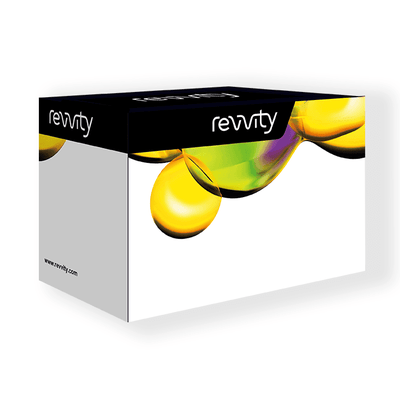
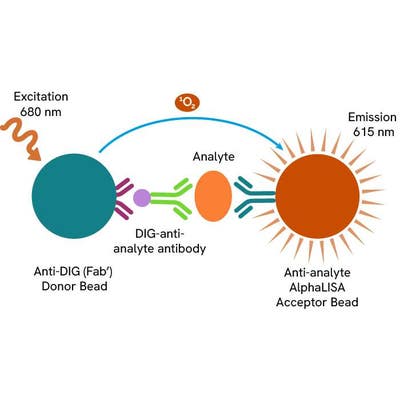
 View All
View All
AlphaLISA Biotin-Free HIV p24 Detection Kit, 500 Assay Points
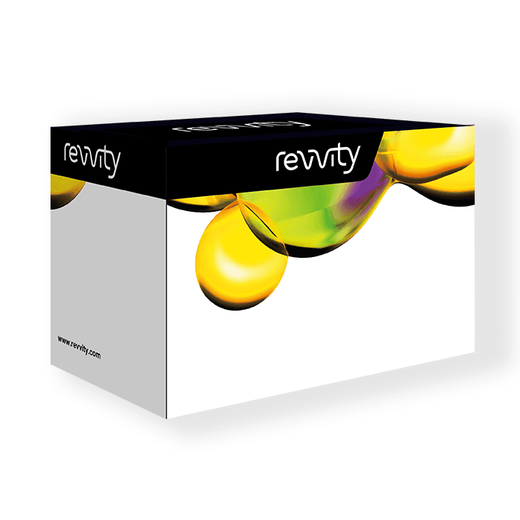
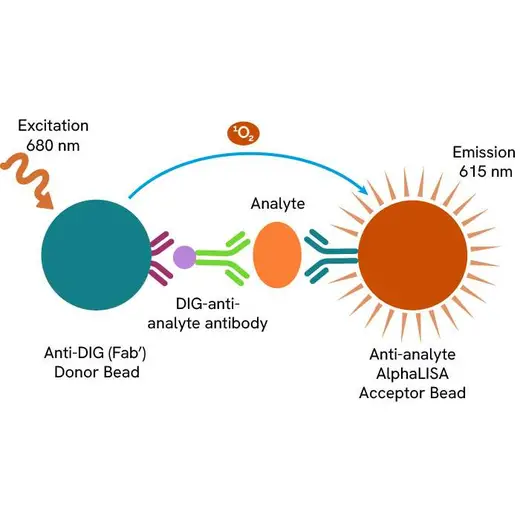



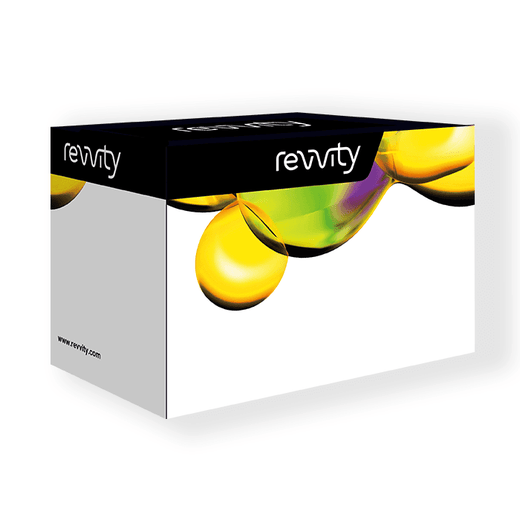
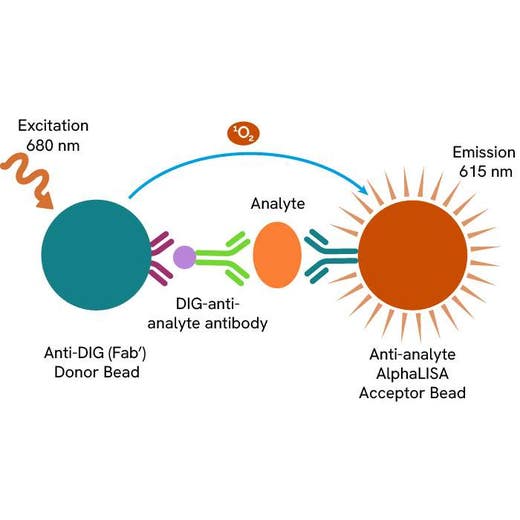



The AlphaLISA HIV p24 Biotin-Free Detection Kit is designed for the quantitative detection of HIV p24 in serum, cell culture medium, and other samples types using a homogeneous (no wash steps, no separation steps) assay. The biotin-free kit uses anti-DIG (anti-Digoxin) Donor beads instead of streptavidin Donor beads, which makes the kit compatible with high-biotin culture media and other sample types that contain high levels biotin (including brain/liver tissue extracts, milk and eggs).
For research use only. Not for use in diagnostic procedures. All products to be used in accordance with applicable laws and regulations including without limitation, consumption and disposal requirements under European REACH regulations (EC 1907/2006).
| Feature | Specification |
|---|---|
| Application | Protein Quantification |
| Dynamic Range | 10 - 100,000 pg/mL |
| Limit of Detection | 9.6 pg/mL |
| Limit of Quantification | 35.4 pg/mL |
| Sample Volume | 5 µL |
The AlphaLISA HIV p24 Biotin-Free Detection Kit is designed for the quantitative detection of HIV p24 in serum, cell culture medium, and other samples types using a homogeneous (no wash steps, no separation steps) assay. The biotin-free kit uses anti-DIG (anti-Digoxin) Donor beads instead of streptavidin Donor beads, which makes the kit compatible with high-biotin culture media and other sample types that contain high levels biotin (including brain/liver tissue extracts, milk and eggs).
For research use only. Not for use in diagnostic procedures. All products to be used in accordance with applicable laws and regulations including without limitation, consumption and disposal requirements under European REACH regulations (EC 1907/2006).





AlphaLISA Biotin-Free HIV p24 Detection Kit, 500 Assay Points





AlphaLISA Biotin-Free HIV p24 Detection Kit, 500 Assay Points





Product information
Overview
Formats:
- Our HV (100 assay point) kits allow you to run 100 wells in 96-well format, using a 100 µL reaction volume (10 µL of sample).
- Our 500 assay point kit allows you to run 500 wells in 96-well or 384-well format, using a 50 µL reaction volume (5 µL of sample).
- Our 5,000 assay point kit allows you to run 5,000 wells in 96-well or 384-well format, using a 50 µL reaction volume (5 µL of sample).
Features and Benefits:
- No-wash steps, no separation steps
- Compatible with high biotin samples, including RPMI and high-biotin tissue extracts
- ELISA alternative technology
- Sensitive detection
- Broad sample compatibility
- Results in less than 3 hours
Immunodeficiency Virus (HIV) p24 is the 231 amino acid phosphorylated protein of the capsid forming the conical core of the virus that encapsulates the genomic RNA-nucleocapsid complex. HIV p24 is a cleavage product of the p55 Gag polyprotein by viral proteases. HIV p24 and its 55 kDa precursor play a crucial role in the assembly, maturation, and disassembly of HIV p24 can often be detected two weeks after infection. Subsequently, p24 antibody is produced and complexes with soluble p24 antigen, rendering it undetectable without first dissociating the antibody-antigen complex. Free antigen reappears later in the course of the illness as p24 antibody levels decline. p24 is frequently used for HIV detection in blood, serum samples, and other bodily fluids in acute HIV seroconversion, in neonatal infection, and for monitoring of responses to antiviral drug therapy.
AlphaLISA technology allows the detection of molecules of interest in a no-wash, highly sensitive, quantitative assay. In an AlphaLISA biotin-free assay, a DIG-labeled anti-analyte antibody binds to the anti-DIG-coated Donor beads while another anti-analyte antibody is conjugated to AlphaLISA Acceptor beads. In the presence of the analyte, the beads come into close proximity. The excitation of the Donor beads causes the release of singlet oxygen molecules that triggers a cascade of energy transfer in the Acceptor beads, resulting in a sharp peak of light emission at 615 nm.
Specifications
| Application |
Protein Quantification
|
|---|---|
| Automation Compatible |
Yes
|
| Brand |
AlphaLISA
|
| Detection Modality |
Alpha
|
| Dynamic Range |
10 - 100,000 pg/mL
|
| Limit of Detection |
9.6 pg/mL
|
| Limit of Quantification |
35.4 pg/mL
|
| Product Group |
Kit
|
| Sample Volume |
5 µL
|
| Shipping Conditions |
Shipped in Blue Ice
|
| Target |
p24
|
| Target Class |
Biologics
|
| Technology |
Alpha
|
| Therapeutic Area |
Virology
|
| Unit Size |
500 Assay Points
|
Video gallery

AlphaLISA Biotin-Free HIV p24 Detection Kit, 500 Assay Points

AlphaLISA Biotin-Free HIV p24 Detection Kit, 500 Assay Points

Resources
Are you looking for resources, click on the resource type to explore further.
AlphaLISA™ technology is a highly sensitive, easy-to-use, and reproducible method for detecting and quantifying molecules in...


How can we help you?
We are here to answer your questions.






























